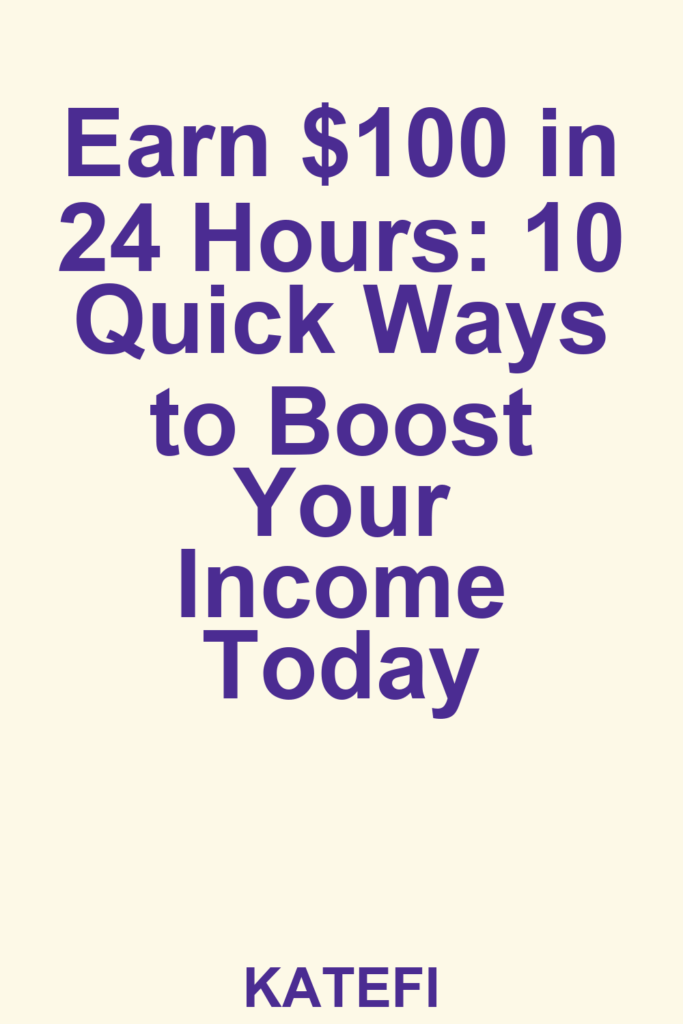10 Common Misconceptions About Freelancing You Should Know
Freelancing has become one of the most talked-about ways to earn a living in today’s digital age. As more individuals opt for remote work and the gig economy expands, it’s crucial to demystify the freelancing landscape. Despite its popularity, numerous misconceptions surround freelancing. Understanding these can empower you to make informed choices about your career path.
Love our content? Show your support by following us — pretty please!🥺
FOLLOW ON PINTEREST
Hi! I’m Kate, the face behind KateFi.com—a blog all about making life easier and more affordable.
In this article, we’ll explore ten common misconceptions about freelancing, providing clarity and guidance. Additionally, we’ll look into geo tactics and the best offers available by country to help you leverage your freelancing efforts.
1. Freelancing Equals Financial Instability
Learn to create and sell AI-powered content in under 3 hours. No face on camera, no tech headaches — follow the FIR formula and post in minutes.
One of the most prevalent myths about freelancing is that it leads to financial instability. While it’s true that income can fluctuate, many freelancers cultivate diverse revenue streams. For example, some choose to offer different services based on their skills, while others may combine freelancing with part-time jobs or passive income sources.
To illustrate, here’s a comparison of average hourly rates in various countries:
| Country | Average Hourly Rate |
|---|---|
| United States | $35 |
| Canada | $30 |
| India | $15 |
| Philippines | $12 |
| Brazil | $20 |
This variation shows that freelancers can strategically choose markets based on their expertise and the demand for their services.
2. You Need a Formal Degree
Another common misconception is that you need a formal degree to be a successful freelancer. While having credentials can help, many successful freelancers do not have specialized degrees in their fields. Skills, experience, and a strong portfolio often matter more than formal education.
Platforms like WritingJobs allow you to showcase your writing skills without needing a formal qualification. Demonstrating your expertise through projects and real-world applications is often more impactful.
3. Freelancers Are Always Overworked
🚀 Freecash is a fast-growing rewards hub. Pick an offer, finish the task, get paid.
- Instant cashout options
- Daily bonuses & streak multipliers
- Verified tasks with competitive payouts
While the image of the “always busy freelancer” is common, this isn’t universally true. Many freelancers intentionally manage their workload to achieve a work-life balance. Flexibility is one of the core advantages of freelancing; you can choose how much work to take on.
By utilizing platforms like ChatJobs, freelancers can select roles that fit their schedule and capacity, making it easier to avoid burnout.
4. You Must Work Alone
Some may believe that freelancing is a solitary endeavor, but that’s far from the truth. Freelancers often network with other professionals, collaborate on projects, and participate in community events. Moreover, freelancing platforms provide forums and networking opportunities.
For those looking to build connections, AI Marketers Club offers a vibrant community where freelancers can exchange ideas and collaborate on projects, enriching the freelancing experience.
5. Freelancing Offers No Benefits
Play games, complete surveys, try apps — then cash out to PayPal, crypto, or gift cards. Fast and beginner-friendly.
Many assume freelancers lack benefits such as health insurance, retirement plans, and paid leave. While it’s true that freelancers must often secure their benefits independently, they can choose plans that best suit their individual needs.
Additionally, many freelancing platforms, like Freecash, offer cash rewards and incentives that can help freelancers fund these benefits.
6. Freelancers Have No Job Security
Job security in freelancing can vary significantly depending on the industry, demand for skills, and personal branding efforts. With the rise of the gig economy, many companies actively seek freelancers, thus creating opportunities for secure, long-term contracts.
For example, in countries with high demand for tech and creative skills, such as the United States and Germany, many freelancers secure repeat clients and long-term projects, mitigating the risk of job insecurity.
7. Freelancers Don’t Make Enough Money
Apply to writing gigs that fit your schedule. From short reviews to blog articles — choose clear payouts and deadlines.
It’s a common belief that freelancers earn less than their employed counterparts. However, freelancers often charge higher rates than salaried employees due to their unique skill sets and the flexibility they provide. In many cases, freelancers can earn more than full-time employees, especially as they gain experience.
A quick breakdown of potential earnings by freelance service highlights this reality:
| Service | Average Earnings Per Hour |
|---|---|
| Graphic Design | $25-$100 |
| Content Writing | $20-$70 |
| Web Development | $30-$150 |
| Social Media Management | $15-$50 |
These figures illustrate that many freelancers can earn competitive wages while enjoying the flexibility of self-employment.
8. Freelancing is Only for Creative Professions
Another myth is that freelancing is only suitable for creative professions, such as writing or graphic design. In reality, freelancing encompasses a wide range of fields, including consulting, programming, marketing, and more. Technical and non-creative skills are highly sought after in the freelancing market.
Freelancers in areas such as cybersecurity, financial consulting, or legal advice can command premium rates due to their specialized knowledge, allowing them to thrive in the gig economy.
9. All Freelancing Jobs are Scams
Unfortunately, the internet has its fair share of scams, leading many to believe that all freelancing jobs are fraudulent. While caution is warranted, there are many legitimate platforms, such as SocialPaid, where clients post genuine job offers.
Using reputable platforms and doing due diligence can help you find trustworthy clients and avoid potential pitfalls.
10. You Need to Market Yourself Aggressively
Answer a quick set of questions and see simple social media tasks that pay. Flexible hours, easy to start.
Many think freelancing requires constant self-promotion and marketing. While having a strong personal brand can help, freelancers can focus on delivering quality work to gain referrals and repeat clients. Building a portfolio showcasing your best work can often speak volumes more than aggressive marketing tactics.
Platforms like ChatJobs provide opportunities to connect with clients and showcase your skills without having to market yourself constantly.
Final Thoughts
Freelancing offers a flexible, rewarding path that is often misunderstood. By debunking these common misconceptions, you can make more informed decisions about entering the gig economy. With the right tools, resources, and a clear understanding of the landscape, freelancing can be a fulfilling and profitable career choice.
As you consider diving into freelancing or seeking to enhance your existing freelance career, platforms like
Take a short quiz, match to openings, and see options paying per-task or hourly. Beginner-friendly and fully online.





















